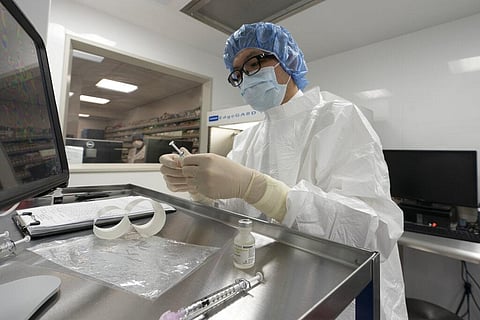

MELBOURNE: Australia on Friday stopped the further development of a COVID-19 vaccine candidate as several participants in the early-stage trials generated antibodies for HIV after receiving the potential therapeutic.
There were no serious adverse events or safety concerns reported in the 216 participants of the phase 1 trial of the v451 COVID-19 vaccine candidate being developed by the University of of Queensland (UQ) in collaboration with biotech company CSL, according to a statement.
However, data showed that some patients developed antibodies towards fragments of a HIV protein (gp41), which was used to stabilise the vaccine, it said.
Following consultation with the Australian Government, UQ and CSL decided not to progress the vaccine candidate to phase 2 and 3 clinical trials.
The vaccine was one of four candidates that Australia had committed to buy and accordingly agreements were made to secure 51 million doses of the experimental vaccine.
UQ said the trial participants were fully informed of the possibility of a partial immune response to this protein component, however, it was unexpected that the antibody levels induced would interfere with certain HIV tests.
The university said there is no possibility the vaccine causes infection, and routine follow up tests confirmed there is no HIV virus present.
The decision was taken after the makers consulted experts who worked out the "implications" that this issue presents to rolling out the vaccine into broad populations, it said.
Reacting to the announcement, Australian Prime Minister Scott Morrison said abandoning the trial should show Australians the Government and researchers were proceeding carefully.
"What happened today is not a surprise to the Government. We are moving swiftly but not with any undue haste," he said, adding the system's working as it should and Australians are protected, as always.
The University of Queensland commenced the phase 1 trial of v451 in July 2020, to assess its safety and immunogenicity in healthy volunteers.
It said the vaccine candidate has shown that it elicits a robust response towards the novel coronavirus and has a strong safety profile.
However, significant changes would need to be made to well-established HIV testing procedures in the healthcare setting to accommodate rollout of this vaccine, according to the statement.
Although the makers have abandoned further trials, the university said the phase 1 trial will continue to assess how long the HIV antibodies persist, adding studies so far show that the levels are already falling.
The University of Queensland also plans to submit the full data for peer review publication.
UQ vaccine co-lead, Professor Paul Young, said that although it was possible to re-engineer the vaccine, the team did not have the luxury of time needed.
"Doing so would set back development by another 12 or so months, and while this is a tough decision to take, the urgent need for a vaccine has to be everyone's priority, Young said.
"I said at the start of vaccine development that there were no guarantees, but what is really encouraging is that the core technology approach we used has passed the major clinical test.
It is a safe and well-tolerated vaccine, producing the strong virus-neutralising effect that we were hoping to see," he said.
Andrew Nash, Chief Scientific Officer for CSL noted that this outcome highlights the risk of failure associated with early vaccine development, and the rigorous assessment involved in making decisions as to what discoveries advance.
Reacting to the announcement, Sanjaya Senanayake, a specialist in Infectious Diseases and Associate Professor of Medicine at The Australian National University, said while it is disappointing that an Australian vaccine candidate has been taken off the table, it is not surprising that one of the many COVID-19 vaccines has failed.
"In general, about 90 per cent of vaccines never make it to market.
As a global community, we have been spoilt with the unprecedented swiftness and success with which the development of COVID-19 vaccines have taken place," Senannayake said.
Diego Silva from Sydney Health Ethics in the University of Sydney School of Public Health noted that although the development might seem counter-intuitive, from a research ethics viewpoint, this is a success.
"Science cannot be all about producing positive results; negative results will and must occur.
Negative results are also as important as success in science, since they, too, form part of the evidence base for future research," said Silva.
"The researchers at UQ did the right thing by prioritising the safety of participants and the soundness of science by stopping when they did," he added.